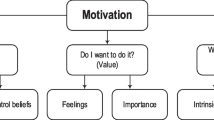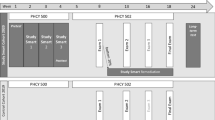Abstract
Introduction
Medical education is oftentimes stressful and has been documented to compromise student well-being, hinder performance, and contribute to burnout. Many medical schools aim to foster students’ sense of well-being. This can be accomplished by peer-assisted learning (PAL), which has the potential to improve student wellness and performance in medical school.
Methods
The PAL program at Nova Southeastern University Dr. Kiran C. Patel College of Allopathic Medicine provides first-year medical students with educational sessions related to their curriculum, led by second-year medical students. The goal of this study was to determine the efficacy of PAL in promoting wellness and enhancing knowledge. Pre- and post-program surveys were distributed to students prior to and after the completion of PAL. Data analysis included frequencies of responses, qualitative analysis, and chi-square analysis.
Results
Thirty-eight out of 51 first-year medical students responded to the pre-program survey (response rate 75%) and 23 out of 51 responded to the post-program survey (response rate 45%). A majority of respondents from the pre-survey believed that PAL would provide them with tools necessary to be successful. These findings were similar in the post-program survey with a majority of attendees sharing that PAL enhanced their knowledge, reduced test-taking anxiety, and provided useful skills.
Discussion
Results from the pre- and post-program surveys suggest that PAL can enhance student well-being while improving knowledge of the material taught in medical school.



Similar content being viewed by others
Availability of Data and Materials
The datasets generated and analyzed for this study are available from the corresponding author on reasonable request.
References
Ishak W, Nikravesh R, Lederer S, Perry R, Ogunyemi D, Bernstein C. Burnout in medical students: a systematic review. Clin Teach. 2013;10:242–5.
West CP, Dyrbye LN, Shanafelt TD. Physician burnout: contributors, consequences and solutions. J Intern Med. 2018;283:516–29.
Haffizulla FS, Newman C, Kaushal S, Williams CA, Haffizulla A, Hardigan P, et al. Assessment of burnout: a pilot study of international women physicians. Perm J. 2020;24:1–5.
Reith TP. Burnout in United States healthcare professionals: a narrative review. Cureus. 2018;10:e3681.
Shanafelt TD, Boone S, Tan L, Dyrbye LN, Sotile W, Satele D, et al. Burnout and satisfaction with work-life balance among US physicians relative to the general US population. Arch Intern Med. 2012;172:1377–85.
Arora M, Asha S, Chinnappa J, Diwan AD. Review article: burnout in emergency medicine physicians. Emerg Med Australas. 2013;25:491–5.
Bullock G, Kraft L, Amsden K, Gore W, Prengle B, Wimsatt J, et al. The prevalence and effect of burnout on graduate healthcare students. Can Med Educ J. 2017;8:e90-108.
Slavin SJ, Schindler DL, Chibnall JT. Medical student mental health 3.0: improving student wellness through curricular changes. Acad Med. 2014;89:573–7.
Neufeld A, Mossière A, Malin G. Basic psychological needs, more than mindfulness and resilience, relate to medical student stress: a case for shifting the focus of wellness curricula. Med Teach. 2020;42:1401–12.
Frajerman A, Morvan Y, Krebs M-O, Gorwood P, Chaumette B. Burnout in medical students before residency: a systematic review and meta-analysis. Eur Psychiatry. 2019;55:36–42.
Moir F, Yielder J, Sanson J, Chen Y. Depression in medical students: current insights. Adv Med Educ Pract. 2018;9:323–33.
Dyrbye L, Shanafelt T. A narrative review on burnout experienced by medical students and residents. Med Educ. 2016;50:132–49.
Shreffler J, Huecker M, Martin L, Sawning S, Thé S, Shaw MA, et al. Strategies to combat burnout during intense studying: utilization of medical student feedback to alleviate burnout in preparation for a high stakes examination. Health Prof Educ. 2020;6:334–42.
Khalid H, Shahid S, Punjabi N, Sahdev N. An integrated 2-year clinical skills peer tutoring scheme in a UK-based medical school: perceptions of tutees and peer tutors. Adv Med Educ Pract. 2018;9:423–32.
Sobowale K, Zhou N, Fan J, Liu N, Sherer R. Depression and suicidal ideation in medical students in China: a call for wellness curricula. J Int Assoc Med Sci Educ. 2014;5:31–6.
Burgess A, Dornan T, Clarke AJ, Menezes A, Mellis C. Peer tutoring in a medical school: perceptions of tutors and tutees. BMC Med Educ. 2016;16:85.
Farkas AH, Allenbaugh J, Bonifacino E, Turner R, Corbelli JA. Mentorship of US medical students: a systematic review. J Gen Intern Med. 2019;34:2602–9.
Santee J, Garavalia L. Peer tutoring programs in health professions schools. Am J Pharm Educ. 2006;70:70.
Guraya SY, Abdalla ME. Determining the effectiveness of peer-assisted learning in medical education: a systematic review and meta-analysis. J Taibah Univ Med Sci. 2020;15:177–84.
Menezes A, Burgess A, Clarke AJ, Mellis C. Peer-assisted learning in medical school: tutees’ perspective. Adv Med Educ Pract. 2016;7:31–8.
Jauregui J, Bright S, Strote J, Shandro J. A novel approach to medical student peer-assisted learning through case-based simulations. West J Emerg Med. 2018;19:193–7.
Williams B, Olaussen A, Peterson EL. Peer-assisted teaching: an interventional study. Nurse Educ Pract. 2015;15:293–8.
Akinla O, Hagan P, Atiomo W. A systematic review of the literature describing the outcomes of near-peer mentoring programs for first year medical students. BMC Med Educ. 2018;18:98.
Strobel J, van Barneveld A. When is PBL more effective? A meta-synthesis of meta-analyses comparing PBL to conventional classrooms. Interdiscip J Prob-Based Learn. 2009;3:4.
Tsou KI, Cho SL, Lin CS, Sy LB, Yang LK, Chou TY, Chiang HS. Short-term outcomes of a near-full PBL curriculum in a new Taiwan Medical School. Kaohsiung J Med Sci. 2009;25:282–93.
Acknowledgements
We would like to acknowledge Kyle Bauckman, PhD, the Director of Research and the Fundamentals Course Director at Nova Southeastern University Dr. Kiran C. Patel College of Allopathic Medicine, for his guidance throughout this project, including suggestions regarding research design and analysis.
Author information
Authors and Affiliations
Contributions
All authors contributed to the study conception, study design, and material collection. Literature review was performed by Caitlin Williams, Therese Vidal, Piero Carletti, and Ahraz Rizvi. Data analysis was performed by Caitlin Williams. The first draft of the manuscript was written by Caitlin Williams and Therese Vidal; revisions of the manuscript were performed by all authors. The figures and tables were created by Caitlin Williams. All authors read and approved the final manuscript.
Corresponding author
Ethics declarations
Ethics Approval
Human subject research approval was granted by the Nova Southeastern University Institutional Review Board on June 16, 2020, approval number 2020–291. The study was conducted in accordance with ethical standards of the Declaration of Helsinki.
Consent to Participate
Waiver of documentation of informed consent was obtained due to the fact that participation was voluntary and no identifiable data was provided with participant responses. An explanation of the consent process was provided to participants at the time of recruitment.
Consent for Publication
Not applicable.
Conflict of Interest
The authors declare no competing interests.
Additional information
Publisher's Note
Springer Nature remains neutral with regard to jurisdictional claims in published maps and institutional affiliations.
Supplementary Information
Below is the link to the electronic supplementary material.
Rights and permissions
About this article
Cite this article
Williams, C.A., Vidal, T., Carletti, P. et al. Peer-Assisted Learning (PAL): Perceptions and Wellness of First-Year Medical Students. Med.Sci.Educ. 31, 1911–1918 (2021). https://doi.org/10.1007/s40670-021-01381-0
Accepted:
Published:
Issue Date:
DOI: https://doi.org/10.1007/s40670-021-01381-0




